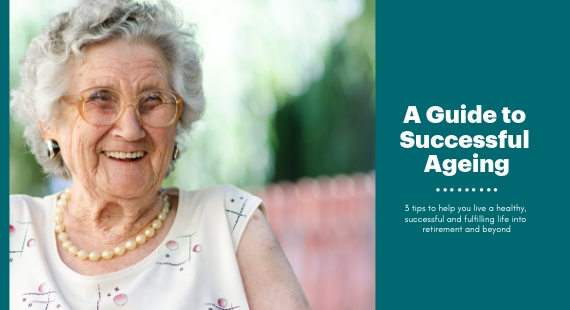
‘Successful ageing’ is a concept that was first popularised in the 1980s - it refers to physical, mental and social well-being in older age.
Generally, a person is deemed to have successfully aged if they:
- have lived free of disability or disease
- have had high mental and physical abilities
- been interacting with others in meaningful ways.
So what practical pieces of advice can our older adult service team at St Patrick's Mental Health Services provide you with, to help you live a healthy, successful and fulfilling life into retirement and beyond?
To start, let’s talk about what we already know about older Irish adults.
The Irish Longitudinal Study on Ageing (or TILDA, as it’s better known) is a large-scale nationally-representative study on ageing in Ireland, carried out by researchers from Trinity College Dublin. The TILDA study (which is still ongoing) began in 2009 and has produced some interesting results to date.
The study has found that:
- 44% of older Irish adults subjectively report that their health is ‘excellent’ or ‘very good’
- Over half of people (51%) aged over 75 years suffer from arthritis
- High blood pressure and diabetes are the most common cardiovascular conditions affecting older people
- Nearly 4 out of 5 older Irish adults are classified as being either overweight or obese
- More than one in five men and one in ten women report problematic alcohol use
- Approximately one in five men and one in four women aged 75 and older have had a fall in the past year.
That’s a summary of the physical health of our older population, but what about quality of life?
Well, the majority of older people happily seem to experience a highquality of life.
In TILDA, the average scores for older people on a quality of life scale (known as CASP-19) was 75%.
Perhaps unsurprisingly, the best quality of life is experienced by older people with the highest asset wealth. However, the group of older people who have the lowest quality of life are not those who are worst off financially, but those who rate their health as fair or poor. Your health really is your wealth!
Older people on the whole seem to perceive the ageing process positively, believing they have considerable control over the positive experiences of ageing, but less over the negative aspects. Interestingly, when studied over two years, older people with negative attitudes towards ageing have been shown to have slower walking speeds and worse mental abilities compared to adults with more positive attitudes towards ageing. Never underestimate the power of positive thinking!
So here are our three tips for successful ageing.
Look after your physical health
- Visit your GP regularly.
- Eat a healthy diet (low in fat, sugar, salt and artificial additives, high in fruit, vegetables and fibre).
- Exercise regularly: 150 minutes of aerobic exercise per week is the magic number concluded by TILDA. If you break this down into five 30-minute walks per week, this goal of 150 minutes should be possible for most people to achieve.*
- Avoid excessive alcohol intake. The recommended weekly alcohol limit is 11 standard drinks for women and 17 standard drinks for men.
- Avoid smoking - smoking is never advisable.
*An interesting study from Kings College London published in 2016 looked at predictors of cognitive function (that is, mental capability and memory) in identical twins over a 10 year period. While the usual indicators such as blood pressure, diet and cholesterol were of course important, the biggest predictor of brain mass and cognitive ability 10 years later was actually thigh muscle bulk, or the strength of the subjects’ legs!
Look after your mental health
- Try to keep in touch with family and friends regularly, and involve yourself in community activities and volunteering projects. TILDA participants with strong social networks who engage in various types of active social relationships and who volunteer regularly were found to have a higher quality of life than those who are less socially active. If you would like to consider volunteering, lots of useful information can be found on the Volunteer Ireland website.
- Stay intellectually active (that is, exercise your mind). This could involve reading a book, doing crossword/Sudoku puzzles or perhaps taking a class. Findings from the Mayo Clinic Study of Ageing have shown that participation in mentally-stimulating activities is linked to a 30% to 50% reduced risk of developing mild cognitive impairment (a diagnosis which often later progresses to dementia).
- Always try to think positively – focus on the good things in life; don’t dwell on the bad.
If you find that you’re constantly feeling sad or have lost interest in things you normally enjoy, speak to your GP - depression and anxiety are common problems amongst older adults.
Plan for your future (think ahead)
- Keep track of your money - even if someone else helps you to manage accounts and investments, always try to stay informed.
- Know your own health and make your healthcare wishes known to your doctor and family. It is often advisable to write down a list of your medical conditions and prescribed medications and to keep this list in your wallet, for use in an emergency situation.
A useful tool which you can use to record any preferences you may have around healthcare and care after death is the Think Ahead form, available from Citizens Information centres, Money Advice and Budgeting Service (MABS) centres and online. The Think Ahead form allows people to record their care preferences for times when they may well be unable to speak for themselves, such as after an accident, in an emergency, or on their death. It comprises a detailed form divided into six sections, encompassing key personal information, care preferences, legal matters, financial matters and care after death. Making important decisions in advance means that your views can be taken into account when you may be too ill to focus on such issues or can no longer speak for yourself, reducing the burden on your loved ones and sparing them from having to make difficult decisions at an already stressful time.
To summarise, over the past 10 years, we have gained a very useful insight into the health of Ireland’s oldest citizens through TILDA.
Successful ageing is a personal experience for each individual and can be achieved through medical, psychological and social inputs which optimise health and result in a fulfilling engagement with life.
Three tips for successful ageing include
- looking after your physical health
- looking after your mental health
- planning for the future.
Successful ageing is really a very achievable goal, towards which we should all strive.
Continue to…
How do we remember and how do we forget?

